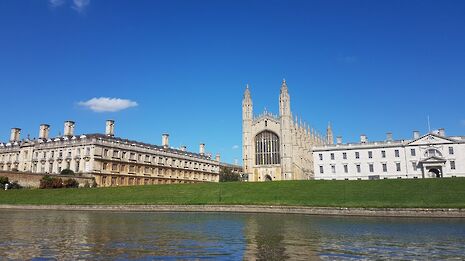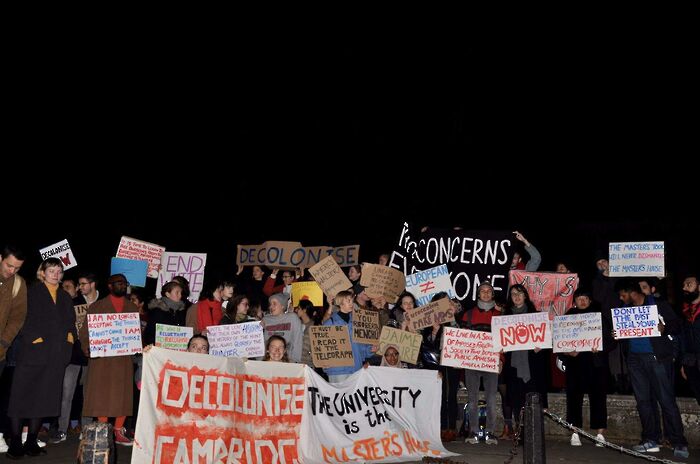
Decolonising the curriculum is no more political than not doing so
MML student Chloe Fitzgerald questions why writers of colour are often viewed as intellectually inferior to white British writers

When it comes to considering the presence of ethnic minorities on the English Literature curriculum, the debate seems to be centred along this line of argument – universities should teach ‘traditional’ authors, as ’it is English literature after all’. Obviously, as we all know, all English authors ever were upper class white men, and nobody else has ever picked up a pen to write about issues to do with this country.
“Throughout history people have been writing about their own experiences, no matter what race they may be, and it is high time we recognised the wealth of literature that exists”
People often argue that this cohort of elites doesn’t represent Britain ‘anymore’. But looking back, has it ever represented Britain? Throughout the centuries racial issues have been prevalent in Britain and, of course, across the British Empire, and citizens have responded to these issues in their various ways. Their responses have not always been valued by the pretty much entirely white elite with the social power to decide what counted as English literature, of course. But this does not mean that other texts didn’t exist, whether written down, sung or spoken. The fact that the elite (now long deceased) did not value these works does not mean they should not be valued now.
Quite the opposite, really. We are lucky to live in a context where most people would agree with the idea that all races should have a voice. We should make the most of that to listen to all those voices, thus vastly enriching our education.
Opponents of diversifying the curriculum often argue that it is patronising to shove a token ethnic minority writer into the syllabus for the pure sake of political correctness. But they are missing the point: it is not necessary to find a ‘token’ ethnic minority writer. Throughout history people have been writing about their own experiences, no matter what race they may be, and it is high time we recognised the wealth of literature that exists. This is no matter of adding ‘token’ non-white authors to syllabuses. This is about recognising that to understand our history and our literature, we have to try to understand the complex role of race.
“Why do we view texts by and about minorities in Britain as peripheral to our history?”
Lola Olufemi wrote in her open letter about how meaningfully including the voices of different ethnicities in the English Literature curriculum “means ensuring that Edward Said’s Orientalism is as essential in preparation for the course as Barthes’ The Pleasure of the Text”. This is the crux of the issue: understanding what has been going on for immigrants across Britain and the former empire is as essential to education as the texts and values of the elites. Without it, we do not have a comprehensive view of our own culture.
Speaking as an MML student, it’s true that there are not many non-white authors on our curriculum either. However, at the moment, we are studying Franz Kafka’s Metamorphosis, in which Gregor Samsa, a travelling salesman, awakes one day to discover himself transformed into an ‘Ungeziefer’, which translates most closely to ‘vermin’, a word that was used at the time as a derogatory term for Jewish people. Kafka was himself Jewish and the possibility of reading the novel as a response to anti-Semitism at the time cannot be, and is not, ignored. A popular reading is that it reflects the anxieties of the Jewish population, torn between assimilation and retaining their own identity. This text is regarded as a cornerstone of European literature, offering a view into the culture of the time, despite the fact that it deals with only one particular group’s experiences.
Yet some people are still squeamish about accepting that the prejudices, experiences, norms and cultures experienced by ethnic minorities in British history are part of what has formed modern Britain. Take Andrea Levy’s Small Island, a novel about Jamaican immigrants to Britain after World War Two. It seems that everyone gets excited over immigration politics for one reason or another, and no-one would deny that it is a part of modern British politics. So why is this sort of insight an interesting aside rather than bang at the centre of English literature? Why do we view texts by and about minorities in Britain as peripheral to our history?
It is as though we think of British history and culture as belonging to these white, upper-class men, and what everyone else gets up to is separate. It might be interesting, but it’s not British and not weighty enough for study. It goes without saying that it’s time for that attitude to change. It’s clear that amongst many students and academics such change would be welcomed. There’s no need to pretend anymore: incorporating literature by and about ethnic minorities is not politically correct tokenism. It is a basic, and long overdue, acknowledgement of British culture

